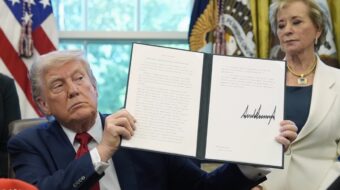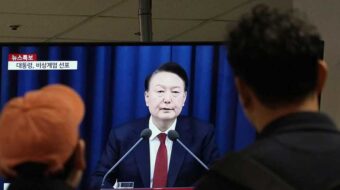CHICAGO — Broad unity is the key challenge facing the anti-ultra-right electoral coalition in the wake of Illinois’ March 21 primary. Victory in two congressional battleground races in suburban Chicago will also require winning independent and moderate Republican voters.
The national spotlight has been on the 6th Congressional District, where Republican Rep. Henry Hyde is retiring. Tammy Duckworth, a political moderate and disabled Iraq war veteran, narrowly defeated Christine Cegelis, an independent, strongly antiwar candidate, in the Democratic primary. A third candidate, Lindy Scott, siphoned off many votes from Cegelis.
Duckworth had the backing in the Democratic Party establishment, the Illinois AFL-CIO and Citizen Action. She will oppose ultra-right Republican state Sen. Peter Roskam. She has a big job of winning over the many disappointed progressive, independent and peace activists who made up Cegelis’ army of volunteers.
Democratic Rep. Melissa Bean in the 8th CD faces a difficult race against right-wing Republican millionaire David McSweeney. Bean, a conservative Democrat, alienated many in labor and the progressive community with her stands on CAFTA, HR 4437, the Patriot Act and cuts to social programs. But, despite these key votes, Bean has a 75 percent voter rating from ProgressivePunch.
The wild card in the race could be the independent campaign of Bill Scheurer, running as a pro-union, antiwar, anti-abortion candidate and supported by the Teamsters and UAW.
Elsewhere, antiwar Democratic congressional candidates will challenge Republican incumbents, including Dan Seals, an African American in the 11th CD opposing Rep. Mark Kirk; “Fighting Dem” John Laesch opposing Republican House Speaker Denny Hastert; and downstate, David Gill against Rep. Tim Johnson. In addition, progressive Democratic Rep. Lane Evans announced his retirement March 28, creating an open seat that must be defended.
A coalition of the African American and Latino communities and labor was decisive in narrowly winning the Democratic nomination for Cook County Board president for the incumbent, John Stroger Jr. Stroger, who suffered a debilitating stroke just days before the primary, defeated Forrest Claypool. Both were establishment candidates, but Stroger, an African American, had gained wide support for his defense of the county hospital system and his opposition to privatization. As the head of the Park District, Claypool had carried out layoffs and privatization of county jobs.
The influence of racism also became a factor in the race. Unfortunately, many liberal and progressive North Side and suburban voters were swayed by Claypool’s “reform” credentials.
In the race for Metropolitan Water Reclamation District, environmentalist Debra Shore became the first public gay candidate to be elected to the countywide body. Alderman Ricardo Munoz was elected to the Democratic Party state committee by advocating an end to the Iraq war and redirecting resources to rebuild the cities.
Gov. Rod Blagojevich faces a serious challenge from moderate Republican State Treasurer Judy Barr Topinka and her extreme right-wing running mate State’s Attorney Joe Birkett.
Blagojevich has faced many criticisms of his policies, but recently called for increasing the minimum wage, has maintained a moratorium on the state’s death penalty, supported the right of health care workers to unionize, and initiated a health care program for uninsured children.
But Blagojevich may have to contend with an independent candidacy of state Sen. James Meeks, executive vice president of the National Rainbow/PUSH Coalition and pastor at Salem Baptist Church, the largest African American church in Chicago. Meeks is tapping anger and frustration over the deepening crisis facing the African American community and growing inequalities in funding, including in education.








